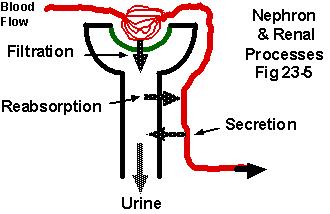
MEASURING BLOOD VOLUME
6 - 8 % OF BODY WEIGHT IN Kg
Dye Dilution Method for Calculating Fluid Volumes:

USE A SUBSTANCE: > 69,000 MW
NOT METABOLIZED
BLOOD VOLUME: CORRECT PLASMA VOLUME (PV) FOR HEMATOCRIT (HCT)
BLOOD VOL = P V x
1
1 - HCT
Calculating Renal Blood Flow and GFR
To calculate Clearance & RBF,
• Inject known amount of a solute, i.v.
• Wait a few minutes
• Measure PA in any artery
• Measure PV in RENAL VEIN
• Measure Rate of urine formation
• Measure [solute]urine
If there were 1 mg of solute Z in 100 ml of plasma, and you found 0.5 mg of Z appearing in the urine/ min, then the clearance of Z would = 50 ml of plasma
Renal Clearance:
The hypothetical volume of plasma from which a substance is completely
removed per minute in one pass thorough the kidney
• U = [solute] in urine (mg/ml)
• V = volume of urine/min (ml/min)
• PA = [solute] in arterial plasma (mg/100 ml plasma
To Calculate Clearance
PA = 1.0 mg/100 ml plasma
U = 0.1 mg/ml
V = 1.0 ml/min
C = 0.1mg/ml x 1.0 ml/min
mg / 100 ml
C = 10 ml/min
Understanding Clearance:
If in this example, 0.1 mg of solute appears in urine / min, in how
much plasma was that 0.1 mg delivered if PA = 1.0 mg/100 ml ?
Answer = 10 ml/min
In other words, that 0.1 mg of solute that appeared in the urine/min
was dissolved in 10 ml of plasma. Thus C = 10 mls/min.
Calculate E
PA = 0.2 mg/100 ml
PV = 0.1 mg/100 ml
E = 0.2 - 0.1 / 0.2
E = 0.5
Renal Plasma Flow
RPF = C / E
RPF = 10 ml/min / 0.5
RPF = 20 ml / min
Renal Blood Flow
RBF = RPF x 1 / 1- hct
If hct = 0.5,
RBF = 20 ml/min x 1 / 1 - 0.5
RBF = 40 ml / min
Calculating Renal BF:
Substance
PA
PV
U
V
X 1.0 mg/100ml 0.8/100 0.2 mg/ml 1 ml/min
Y 1.0 0.3 0.7 1
Z 1.0 0.9 0.1 1
Hct = 0.50
To calculate RBF, first calculate C and E of substance with largest
E
EY = 0.7
CY = 0.7 mg/ml x 1 ml/min
1 mg / 100 mls
CY = 70 ml / min
From C and E, calculate RPF:
RPF = C / E
RPF = 70 ml / min
0.7
RPF = 100 ml/ min
From RPF & Hct, calculate RBF:
RBF = RPF x 1
/ 1 - Hct
RBF = 100 ml / min x 1 / 0.5
RBF = 200 ml / min
GFR = C of solute which is ONLY FILTERED, e.g., inulin.
WHY? See Figure 17.20 to see this concept.
Inferences from GFR
• If Csolute = GFR, solute is only filtered
• If Csolute > GFR, solute is filtered and secreted
• If Csolute < GFR, solute is filtered and reabsorbed
Filtration Fraction
FF = fraction of plasma that is made into filtrate
Usually = 0.2 in humans
Calculate:
FF = GFR / RPF
Inferences from FF:
• If Esolute = FF, solute is only filtered
• If Esolute > FF, solute is filtered and secreted
• If Esolute < FF, solute is filtered and reabsorbed
Assume X from data set (above) is only filtered
Then, GFR = CX = 0.2 x 1
1/ 100
GFR = 20 ml / min
FF = GFR / RPF
FF = 20 ml/min / 100 ml/min
FF = .2

Calculate Amount of a solute filtered / min:
Amount Filtered / min = PA x GFR
For Z, Amt Filt =
1.0mg/100 mls x 20 ml / min
Amt Filt = 0.2 mg / min
Amount of a Solute Appearing in Urine / min
Amt Urine = U x V
For Solute Z, Amt Urine = 1 mg / ml x 1 ml / min
Amt in Urine / min = 0.1 mg / min
Amount reabsorbed / min
= Amt filtered - Amt in Urine
= (GFR x PA) - (U x V)
= (20 ml/min x 1.0 / 100) – 1 mg/ml x 1 ml/min)
= (0.2 mg/min) - (0.1 mg / min)
= 0.1 mg / min is reabsorbed
Amount Secreted / min
= Amt in Urine - Amt Filtered
= (U x V) - (PA x GFR)
= (0.7 mg/ml x 1 ml/min) – (1 mg/ 100 ml x 20 ml/min)
= (0.7 mg/min) - (0.2 mg/min)
= 0.5 mg/min
Inferences:
If UV = GFR PA , solute is only filtered
If UV > GFR PA , solute is filtered and secreted
If UV < GFR PA , solute is filtered and reabsorbed